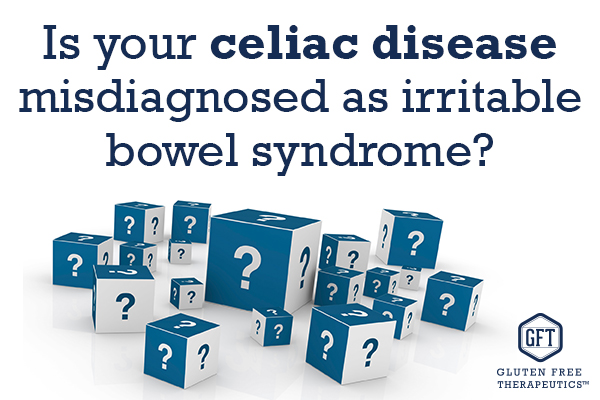
Could your IBS really be celiac disease?
As many as 16 percent of people with celiac disease are misdiagnosed as having irritable bowel syndrome (IBS) before finally receiving a correct diagnosis of CD, according to a 2013 study from researchers in the United Kingdom. This represents a 4-fold increase over a matched control group without celiac disease. Ignoring an official diagnosis and focusing instead on standard treatments for IBS, the researchers found that 28% of patients with celiac disease had been previously treated for IBS while only 9% of the controls received this treatment. The authors state, “Many of the diagnoses of IBS occurred within the last year before diagnosis of celiac disease, but there was a clear excess of IBS even 10 years earlier.”
A longer prodromal period
In a second UK study, researchers found that the period of time a patient experiences vague symptoms before more specific symptoms appear enabling diagnosis (known as the prodromal period) increases when the patients experience symptoms of IBS. Symptoms of IBS during the prodromal period increased the time to CD diagnosis to 10 years versus 7 years without.
Celiac patients’ care is delayed
That’s potentially 28 percent of CD patients whose care is delayed an average of 3 years until a doctor eventually makes the right call. In the meantime, the body’s immune system continues to attack the tissues of the small intestine, cause damage to the absorptive villi, and wreak havoc on other systems that depend on the small bowel for nutrients leading to serious nutrition deficiencies.
The problem with diagnosing CD, or rather with not misdiagnosing it as IBS, arises from the fact that the two conditions do have very similar symptoms. And some studies have suggested that the two conditions may coexist in some patients. For instance, a Polish study found that while some IBS patients who tested positive for celiac disease experienced symptom resolution after following a gluten-free diet (implying these patients actually had celiac disease and not IBS), a few remaining patients experienced only partial relief, which the researchers said suggested a comorbidity comprising both conditions.
Syndrome vs. Disease what is the difference?
The biggest difference between IBS and CD is that IBS is a syndrome, not a disease. What’s the difference? A disease has a known cause as well as quantifiable effect on the anatomy. Syndromes, on the other hand, have no single definitive cause and their effects on anatomy aren’t easy to measure, at least not with the same sort of cut-and-dry analysis of a disease. While syndromes pretty much are associated with the symptoms they cause, a disease is associated more strongly with the permanent or long-term physiological consequences. For instance, while IBS may have many of the same symptoms as CD, it does not cause changes in the physiology of the digestive system – e.g., destruction of the small bowel.
It’s true that gluten can and often does cause gastrointestinal symptoms in people with IBS, including some of the same symptoms that can occur with CD; however, IBS only exists when there are GI symptoms, while CD can occur even without any GI symptoms being present.
Why is it important to distinguish between the two?
The most important reason to insist on a definitive diagnosis if you are suffering from IBS but suspect you may have CD is that treatment and prognosis of the two conditions are different. CD requires strict, lifelong adherence to a gluten free diet. Following a gluten free diet may appear to be simply a matter of convenience, i.e. “can’t I just avoid gluten containing foods?”. The answer is no, cross-contamination of foods prepared in manufacturing plants and restaurants is quite common and those with celiac disease must constantly survey their environment for potential risks. Having celiac disease is also potentially socially isolating and non-adherence to a gluten free diet in those with celiac disease can result in life-threatening complications. For these reasons, it is important to get an accurate diagnosis of celiac disease if you suspect you have it rather than placing yourself on a gluten free diet without the assistance of the medical community.
Getting the Right Diagnosis
We know the importance of an accurate diagnosis but getting one can be problematic. One way to tell the difference between IBS and CD is to determine if you also suffer from symptoms like joint pain, osteoporosis, anemia, or another auto-immune disorder, all of which commonly occur with CD. But the best way is with a blood test and, definitively, a small bowel biopsy. Like most medical tests, biopsies are not inexpensive, and getting a doctor to agree to one can be difficult unless your blood test shows an abnormal level of auto-antibodies associated with celiac autoimmunity. Most importantly, if you have symptoms of IBS or you’ve been diagnosed with the condition, it is not recommended to go on a gluten-free diet if you want to be tested for CD in the near future. Avoiding gluten can cause your blood tests to come back with a false negative, which can also delay your diagnosis. In order to allow a proper diagnosis, it is better to your tests done prior to eliminating gluten.
In Summary
Up to 28% of people who have celiac disease are first treated for IBS. Symptoms of IBS during the prodromal period delayed accurate diagnosis by three years. A delayed or incorrect diagnosis leads to unnecessary intestinal damage that can result in serious nutritional deficiencies, and secondary malabsorptive related conditions (for example anemia, osteopenia, peripheral neuropathy).
If you have been diagnosed with IBS but suspect you have celiac disease it is important to discuss this with your medical professional.
This original article is made possible by Gluten Free Therapeutics. Our mission is to educate, inform, and provide the most effective nutritional products possible to allow those with celiac disease and serious gluten intolerances to heal their bodies. CeliVites complete line of superior gluten free supplements includes multivitamin/multimineral supplements, iron supplements, and calcium supplements for people living with celiac disease. All CeliVites products are designed to help you heal, restore and rebuild your body, because going gluten free isn’t enough!
Comments ()
















i am wondering… Is this the same disease that is called C Dif? My girlfriend is in the hospital as I text and her symptoms are such as this celiac disease. She has been diagnosed with C Dif and is very ill. I will share this info with her. Thank you
I had C-Dif .it is contagious . It is the good bacteria has been taken up by more bad bacteria. The one cause is the use of having taken to many anti-biotics. Much different than IBS or celiac. You can’t control your bowels at all with C-Dif. Constant bowel movement.
I was diagnosed with being gluten sensitive in 2004, but at the same time I had another blood test done and it concluded that I had Candida also. I think they come together many times and I had to work on both. When I was young and ignorant, in my teens, I had countless buts with strep throat and several times a year I was prescribed with an enormous amount of antibiotics–I think this is the result of the problems that later surfaced. I have been very careful since 2004 in not eating anything with gluten and I am also aware of foods that contain yeast and many vitamins and other supplements also contain yeast. Yeast is used in almost all supplements and citric acid is one that contains yeast. Watching out for yeast and gluten are two culprits that I try to make sure I do not ingest. If you want to continue this conversation, just email me.
My son is gluten sensitive.
I have always had stomach issues. In fact when I was in 2 no grade I spent a week in the hospital for throwing up and they couldn’t find a cause. Then as I got older in high school I have sever symptoms that kept me home and often to the hospital every other day. Some tests were run and the doctor said all he knew was possible spastic colon. A diet change was recommended, but only to stay away from fried or greasy foods. My mother would make me the most bland food she could, then make my favorite meal and wave it under my nose because I couldn’t have it. Fast forward to last year I was told I had a autoimmune disorder and needed to stay away from gluten. Since I also have a thyroid disorder and at the time meds were not working I thought it was a autoimmune disorder to do with that. I did go Gluten free for almost a year and felt good. Then hubby lost his job and we had to go back to what was the cheapest way to eat. (Fresh foods are actually more expensive here than processed, sadly.) Then I started feeli g bad again. I recently went to another doctor and said something about what the one doctor said and maybe being celiacs. He said the best way to tell was go on a Gluten free diet and see how I feel as the tests are very expensive (with no insurance). I told him I had been and felt pretty good and didn’t have the stomach issues I was having at the time and and before. He said there is your answer. So, that stands to question have I actually had it all along and technology not being like it is now the reason it went undiagnosed? Also, no one else in my family has this (that I know of), so how could I have gotten it? I am now back on the diet for three weeks now while I still have some symptoms which I know I will for awhile from going through this before. I am also doing better in other ways. Just trying to learn about celiacs verse what I thought I had before.
Hello Karla, Your story is not uncommon. Many people live years of their lives without knowing they have celiac disease. It is a genetic autoimmune disease so the genes were passed on to you through someone in your family. It is great that you were able to take the information your have been given by your doctors over the years to figure out that your medical history was leading you to the path of diagnosis. We still feel that everyone should be properly diagnosed with a scan but certainly understand the expensive may be prohibitive without insurance. The treatment is the same no matter how you are diagnosed. A strict gluten free diet is essential to your healing. It is not uncommon for people with celiac disease to have other autoimmune diseases if they are not treated. Your thyroid disease is a good example. So remember that your diet is healing your body and possibly preventing you from contracting another autoimmune disease. Stay on the GF diet and you should be feeling better and better the longer you are on it.
Take care and good luck